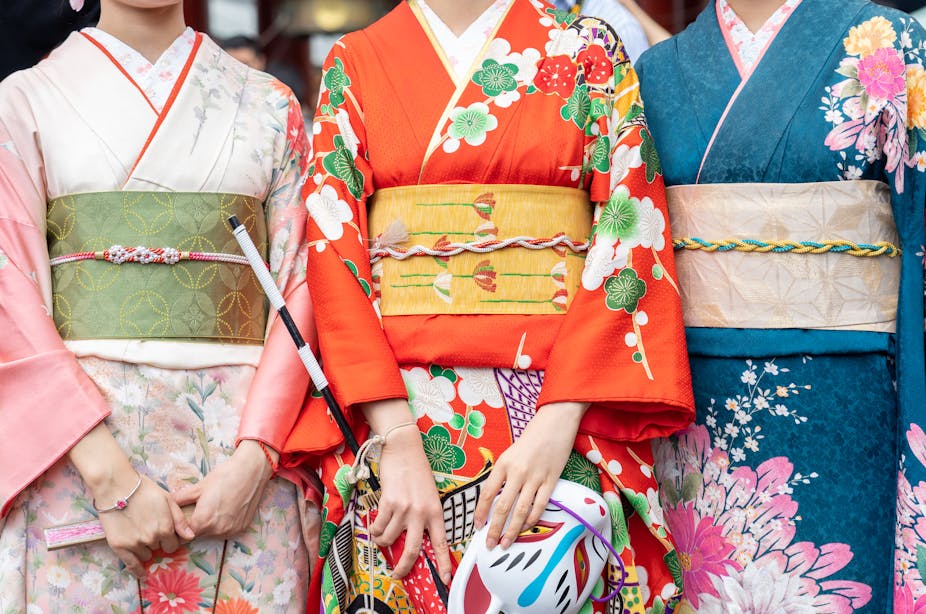Community, Leadership, Experimentation, Diversity, & Education
Pittsburgh Arts, Regional Theatre, New Work, Producing, Copyright, Labor Unions,
New Products, Coping Skills, J-O-Bs...
Theatre industry news, University & School of Drama Announcements, plus occasional course support for
Carnegie Mellon School of Drama Faculty, Staff, Students, and Alumni.
CMU School of Drama
Monday, August 29, 2022
How the kimono became a symbol of oppression in some parts of Asia
theconversation.com: A woman in Suzhou, China, was reportedly detained recently for “provoking trouble”. Her alleged crime was being spotted outside wearing a kimono. The woman was dressed like a character from a manga (a Japanese comic). Arresting her might seem dramatic but there is more at play here than a simple fashion faux pas.
Subscribe to:
Post Comments (Atom)

3 comments:
Many aspects of Japanese culture can be traced back to China, including the kimono, but the kimono has now been fully adopted and taken over by the Japanese and is synonymous with their traditional dress. We talk about colonialism so often as being something that white people did to people of color that it is often forgotten that there are other examples of it from history that can be just as painful to those who experienced it. England, Spain, Italy, France, and the United States are spoken about often as the main colonizers, but Japan was evidently so brutal to those they colonized that their traditional dress, the kimono, is seen today as a symbol of oppression and wearing one even just to dress up as a character from a manga can get you arrested for provoking trouble. I can’t think of any examples from white colonialism that compare, although that is not to say that white colonizers were any less brutal to those they colonized.
Being someone who is born and raised in China and deeply connects to the Chinese culture, I often feel many parts of my culture has been used or represented as the Japanese culture. In these situations, I often feel complexed feeling and often face a hard time in how I should and can discuss these topics with people from other culture. Many events and things in Japanese culture originated from China as a result and an outcome of the history and this is an idea which many believe in as truth. Due to this reason, there is a lot of similarities between these two cultures and sometimes it is hard to differentiate between these two. With the similarities, it is often hard for me to explain why we have such as similar culture and if one culture represents another. Usually, I would answer no and give a brief explanation in my statement. However, with this article, I have realized that it’s not just the similarity but also how many people believe in what is more convenient for them. Often, this is not ignorance or arrogance but a present of how education systems are different from country to country. -Sukie Wang
Articles like these that discuss just how impactful and meaningful clothing can be on a cultural level demonstrates exactly why proper historical and cultural research is important. If one were to give a Chinese character, who was supposed to be wearing traditional Chinese clothing, a Japanese kimono to wear, that mistake would be so culturally egregious and so incredibly misrepresentative of reality that it would not just discredit the designer’s abilities but almost definitely take people out of the show. Portraying cultures authentically and to a degree necessary to keep the world on stage immersive is an important responsibility not just as a costume designer but also as a decent human being who cares about ensuring other people’s backgrounds are respected. This is something I really enjoy about costume design, though- the way cultural context is itself a tool you can use to manipulate the narrative on stage. In the case of character portrayal, one could argue that a Chinese character should wear a Japanese kimono on stage because it reflects a choice the character would make (like in the article, maybe the character is cosplaying a different character from an anime?), at which point that disruption from correct cultural context acts as a signifier to alert audiences to a specific aspect of that characters’ personality.
Post a Comment